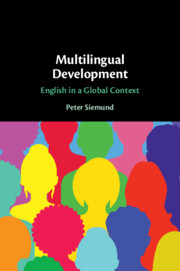Book contents
- Multilingual Development
- Multilingual Development
- Copyright page
- Epigraph
- Contents
- Figures
- Tables
- Preface
- Acknowledgements
- About the Author
- 1 Multilingualism
- 2 On Advantages and Effects of Multilingual Development
- 3 Cross-Linguistic Influence
- 4 Language Development in Multilingual Settings
- 5 Multilingual Language Policies, Identities, and Attitudes
- 6 The New Englishes in Their Multilingual Ecologies
- 7 Patterns and Limits of Multilingualism
- References
- Index
1 - Multilingualism
Past and Present
Published online by Cambridge University Press: 17 January 2023
- Multilingual Development
- Multilingual Development
- Copyright page
- Epigraph
- Contents
- Figures
- Tables
- Preface
- Acknowledgements
- About the Author
- 1 Multilingualism
- 2 On Advantages and Effects of Multilingual Development
- 3 Cross-Linguistic Influence
- 4 Language Development in Multilingual Settings
- 5 Multilingual Language Policies, Identities, and Attitudes
- 6 The New Englishes in Their Multilingual Ecologies
- 7 Patterns and Limits of Multilingualism
- References
- Index
Summary
The first chapter provides an introduction to the field of multilingual development explaining its scientific and societal relevance. The discussion begins with an overview of current globalization and migration processes where, based on OECD data of the past ten years, international migration streams receive illustration and substantiation. Case studies of prominent urban areas include London, Hamburg, Toronto, Vancouver, New York City, San Francisco, Sydney, Melbourne, Auckland, Singapore, Hong Kong, and Dubai. Multilingualism, as such, is not a new phenomenon and may be considered a defining condition of the human species. However, the speed with which it keeps spreading and the density that it developed in urban areas are relatively recent phenomena without historical precedents. These processes are not universal, though. While the Western World appears to have rediscovered multilingualism after a long period of pervasive monolingualism, China currently appears on its way towards a form of social organization in which monolingualism and homogeneity are of paramount importance. The chapter further addresses the social hierarchy of languages and the special role of English in it.
Keywords
- Type
- Chapter
- Information
- Multilingual DevelopmentEnglish in a Global Context, pp. 1 - 43Publisher: Cambridge University PressPrint publication year: 2023

